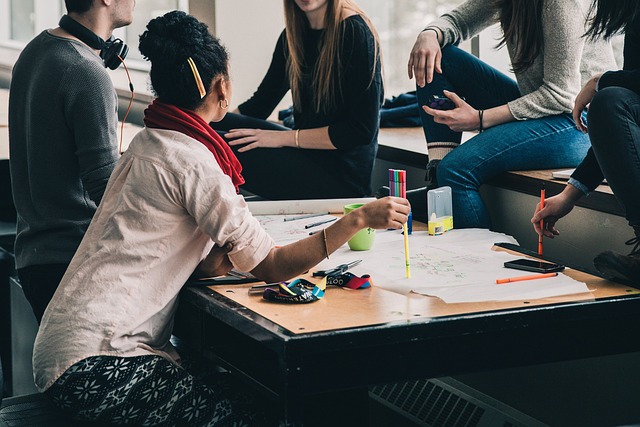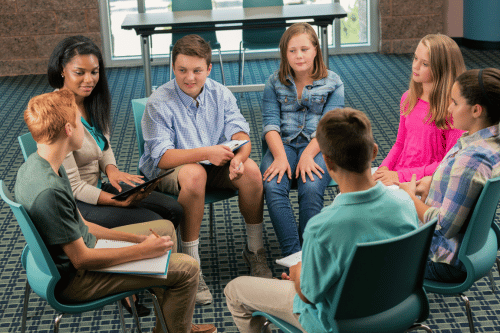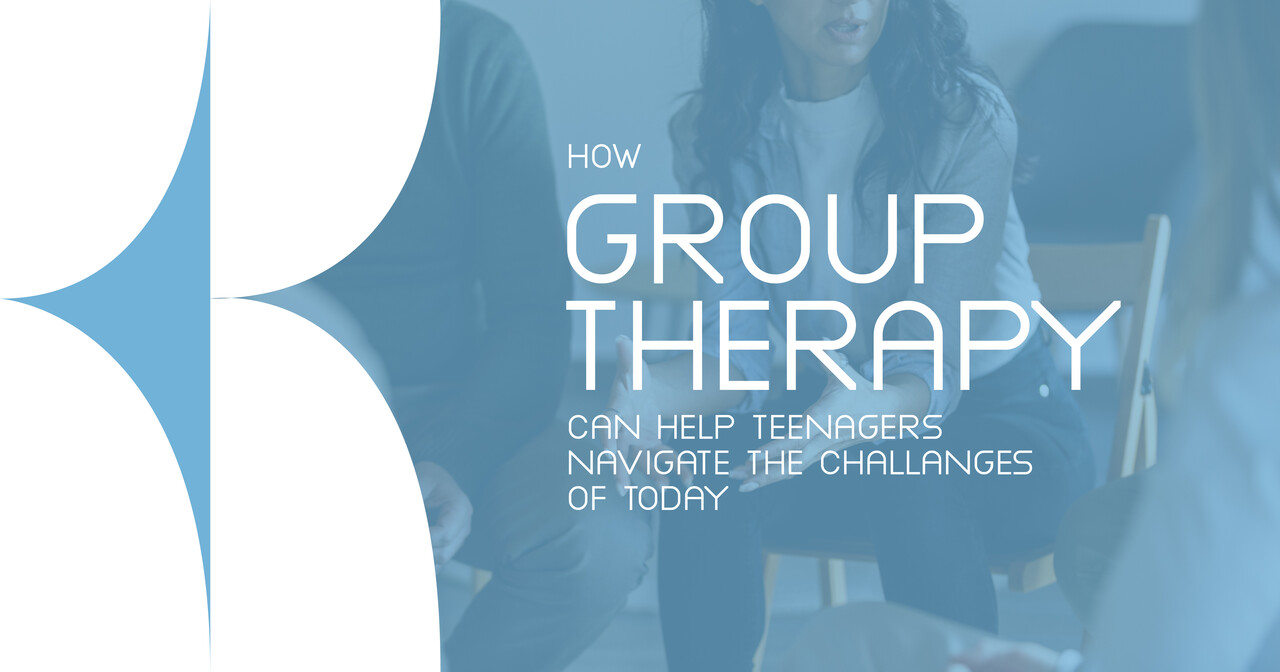Group therapy for teenagers offers a vital support system, providing adolescents with a safe space to share experiences, navigate emotional challenges, and gain insights from peers. In a world full of academic pressure, peer pressure, and mental health struggles, teen group therapy sessions serve as a bridge to better coping strategies, self-esteem, and communication skills. Here, we’ll delve into the benefits of group therapy, highlight essential group therapy activities, and explore how these sessions foster a supportive environment for young people.

Understanding Group Therapy for Teenagers
Group Therapy Defined
Group therapy is a form of therapy where a group of teenagers, guided by a mental health professional, gather in a safe environment to discuss common challenges, experiences, and ways to cope. These therapy programs support teens in building emotional regulation skills, interpersonal skills, and emotional growth. This powerful tool is effective for teenagers facing mental health concerns such as Obsessive-Compulsive Disorder, disruptive behavior, and other mental health conditions.
Therapists may use approaches like Adolescent Mentalization-Based Integrative Therapy, dance movement therapy group, and activities for teens that promote active participation and engagement. These sessions may involve using a sheet of paper for journaling, tracking behavioral patterns, or identifying target behaviors and focal behavior.
How Group Therapy Differs from Individual Therapy
While individual therapy sessions focus on personal issues in a one-on-one setting, group therapy emphasizes shared discussion and peer support. Teen group therapy helps adolescents understand communicative behavior patterns and encourages active listening and feedback from others. Teens can observe how others handle similar mental disorders, using observing behavior and analysis of motor skills as part of the process.
Group therapy promotes a communicative environment that enhances communication strategies and supports core strategies for managing stress. In contrast to the more isolated nature of individual therapy, group settings help teens identify conditional behavior, improve conversation analysis, and feel connected through shared topic of conversation.
Benefits of Group Therapy for Teenagers
1. Peer Support and a Supportive Environment
Teen group therapy sessions provide a supportive environment where young people feel understood by others who face similar challenges. This peer support helps teens feel less isolated, knowing they’re not alone in their experiences. Group therapy for teenagers enables group members to form connections, share, and feel valued.
2. Building Coping Skills
In group therapy, adolescents learn and practice new coping skills to handle stressors in their daily lives. Therapy groups introduce teens to techniques for managing anxiety, depression, and behavioral issues. As they practice these coping skills in a safe space, teens gain confidence in using them outside the group setting.
3. Improving Communication Skills and Self-Esteem
One major focus of adolescent group therapy is communication. Teens learn how to express themselves effectively, improve communication skills, and gain self-awareness. As they grow more confident in group discussions, their self-esteem improves, and they learn to value their voices.
4. Learning Healthy Coping Strategies
Through group therapy activities, teens are introduced to healthy coping strategies to replace any harmful behaviors they may have developed. Whether it’s academic pressure or social issues, these healthy strategies empower teens to respond positively to stress.
5. Personal Growth and Self-Awareness
Teen group therapy is also instrumental in promoting personal growth and self-awareness. As teens reflect on their thoughts and behaviors in the group setting, they become more mindful of how their actions affect others. This self-awareness is crucial for personal growth and building empathy.
Key Components of Teen Group Therapy Sessions
Group Therapy Activities
Therapy activities for teens vary widely, but they typically involve group therapy activities that encourage expression and teamwork. Activities such as role-playing, creative methods like art therapy, or problem-solving exercises foster camaraderie and group cohesion. Each teen group therapy session is tailored to help teens communicate better and find new coping skills.
Role of the Group Leader
The group leader, often a licensed therapist, facilitates each session, guiding teens through exercises and group discussions while ensuring a safe space. This leader plays a critical role in helping teens navigate difficult conversations, explore their emotions, and build trust within the group therapy settings.

Types of Therapy Groups for Teenagers
Process-Oriented Groups
Process-oriented groups focus on the feelings and thoughts that emerge in the moment, encouraging teens to share openly. This approach helps them understand how their behavior impacts other group members and promotes personal insight.
Dialectical Behavior Therapy (DBT) Groups
Some therapy groups for teens employ dialectical behavior therapy, a form of therapy that focuses on emotional regulation, mindfulness, and coping skills. DBT is especially effective in addressing emotional instability and building healthy coping strategies in teens.
Challenges Addressed in Group Therapy for Teenagers
Addressing Peer Pressure and Academic Stress
Teen group therapy often addresses common struggles such as peer pressure and academic stress. By discussing these issues in group sessions, teens gain a supportive environment to talk about their challenges and brainstorm solutions with their peers.
Managing Mental Health Challenges
Many teenagers struggle with mental health issues, and group therapy provides an ideal space for addressing these concerns. Whether dealing with anxiety, depression, or substance abuse, the group therapy setting offers teens the tools to manage these issues with support from other group members.
How Group Therapy Complements Family Therapy
While group therapy is highly beneficial, it often works well alongside family therapy. Family therapy sessions allow teens and family members to address underlying issues affecting family dynamics. The combination of family and group therapy can enhance communication and improve the family’s ability to support the teen.
Common Group Therapy Activities for Teens
Therapy activities for teens may include a variety of methods designed to encourage expression, build trust, and enhance social skills. Below are some popular activities:
- Role-Playing Exercises – Helps teens practice responses to peer pressure or challenging social situations.
- Creative Methods – Art, music, or movement activities to help teens express emotions non-verbally.
- Group Games – Fun, interactive games that promote cooperation and trust-building.
- Group Discussion Exercises – Facilitated discussions on topics like self-esteem, self-awareness, and healthy relationships.
- Problem-Solving Tasks – Encourages teamwork, critical thinking, and conflict resolution.
Preparing Teens for Group Therapy

Creating a Safe Space
Teens thrive in group therapy when they feel safe to express themselves. The group leader works to foster an inclusive, non-judgmental environment where every participant feels respected. A safe space is essential for effective teen group therapy, as it helps participants feel comfortable sharing personal thoughts and emotions.
Setting Goals for Personal Growth
In teen group therapy, goal-setting plays a crucial role. Group members work together to establish objectives for improving social skills, building self-esteem, and developing self-awareness.
FAQs about Group Therapy for Teenagers
1. What is the main purpose of group therapy for teenagers?
The primary goal is to provide teens with a supportive environment where they can learn coping skills, improve self-esteem, and connect with others facing similar struggles.
2. How does group therapy differ from individual therapy?
Group therapy focuses on peer support and interaction within a group setting, while individual therapy is a one-on-one approach between the teen and the therapist.
3. Can family members be involved in group therapy?
Typically, group therapy sessions are for the teens only, but family therapy sessions can complement group therapy by addressing family-related issues.
4. What are some common issues addressed in teen group therapy?
Teen group therapy often addresses issues like academic stress, peer pressure, substance abuse, and mental health challenges such as anxiety and depression.
5. How long do group therapy sessions usually last?
Group therapy sessions usually last between 60 to 90 minutes, with each teen group therapy session focusing on specific topics or activities aimed at building coping and communication skills.
Conclusion
Group therapy for teenagers is a powerful therapeutic approach that helps young people navigate the challenges of adolescence. Through group therapy sessions, teens gain invaluable social skills, coping techniques, and self-awareness. The supportive environment fostered in teen group therapy empowers them to face life’s pressures with resilience and confidence, laying a strong foundation for mental well-being and personal growth. Visit SAMHSA for more information or contact us today.









